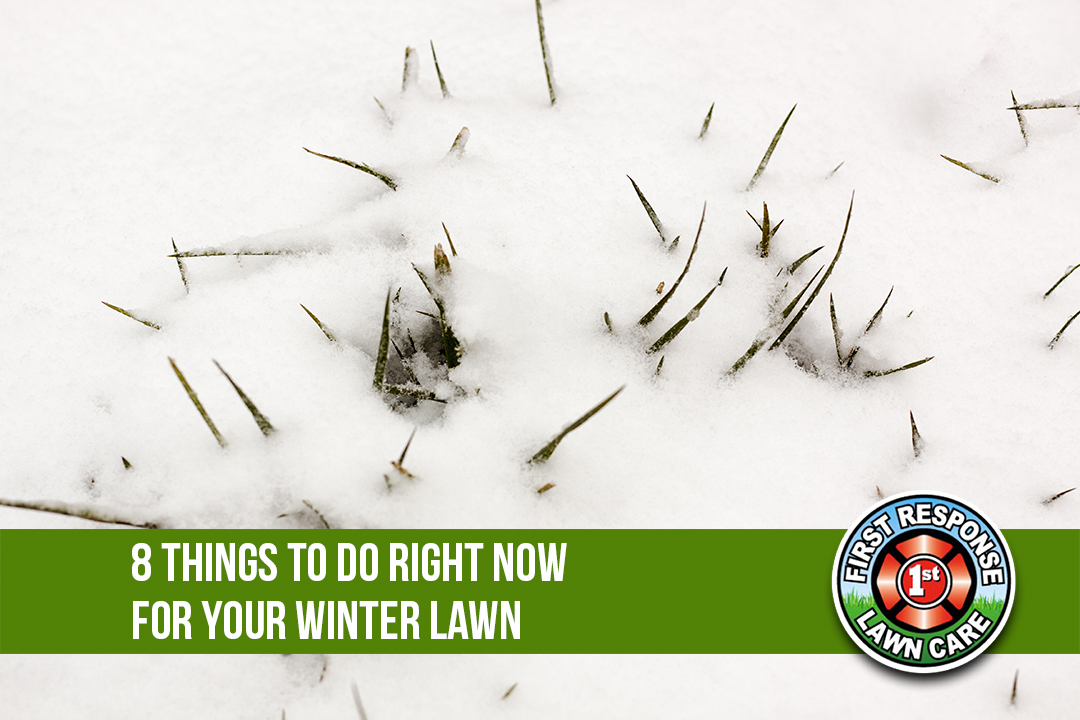
by admin | Jan 24, 2019 | Fertilize Treatments Rockwall, Gardening Tips, Lawn Aeration Rockwall, Lawn Care Royse City, overseeding ryegrass rockwall, Pre emergent Service Fate TX, Shrub Trimming Caddo Mills, Weed Control Fate, Weed Control Royse City, Winterizing, Winterizing Your Lawn
Here are 8 Things To Do Right Now For Your Winter Lawn. Texas’s warm humid climate and rich soil, is ideal for plant life. Gardens here show evidence of that.
With the first official day of Spring still over a month away, your attention may be focused mostly indoors. Even in the cold winter months, however, our lawns and gardens have specific needs. What may look dead and brown but is teeming with life just underneath the surface.
In order to reduce pests and ensure that your plants and grasses will thrive as the weather warms up, your Texas winter gardening regimen should include these essential steps.
TIPS FOR SUCCESSFUL TEXAS WINTER GARDENING.
Apply Pre-emergents
Now is the time to apply your pre-emergent on lawns and grasses to prevent the germination of weed seeds. The window of opportunity is open right now. Corn gluten meal is a great organic approach, but other herbicides can be purchased at your local nursery or home improvement store. Pre-emergent is a small step that yields BIG dividends in spring and summer.
Fertilize
If you haven’t done so already, fertilize all established trees and shrubs (except azaleas and camellias), and feed perennial bulbs. This can be done simultaneously with the pre-emergent. Your compost pile is perfect for this use, or check with your local garden center for recommendations.
Watch the weather
Historically, the coldest days of the year fall in the month of February. This does not come as great news to those of us yearning for the warmer weather, but gardeners should be on watch for a potential freeze all the way into the month of March. Make sure to water the roots well, and cover plants if temperatures fall below 32 degrees.
Pruning
This is the best time to prune shrubs, trees, and roses, but wait to prune spring flowering trees until after they bloom. Crepe Myrtles are the exception to this rule. Experts advise that crepe myrtles should never be pruned or can be pruned very gently.
Mowing
Mow your lawn once this month. This will allow the sun to reach the roots.
Clean up
Rake any fallen leaves, for the same reason. Grass roots need sunlight to germinate and begin the new growth cycle. Be sure to remove all debris and other encumbrances to growth. These leaves and other lawn debris can be put into the compost bin for later use as fertilizer.
Weeding
Dig weeds out by hand. There may only be a few, but soon they will become legion. Tackle the small job now, to avoid a larger one later.
Plant bulbs
Now is the time to plant later blooming bulbs and tubers such as dahlias, elephant ears, caladiums, and calla lilies. This is also the perfect time to plant strawberries.
Yes, it is cold outside. But if you want to have a beautiful landscape when spring comes, the time to begin is now.
Questions? Contact First Response Lawn Care by clicking the link below to ask about our expert services in all these areas!
Contact First Response Lawn Care Today!
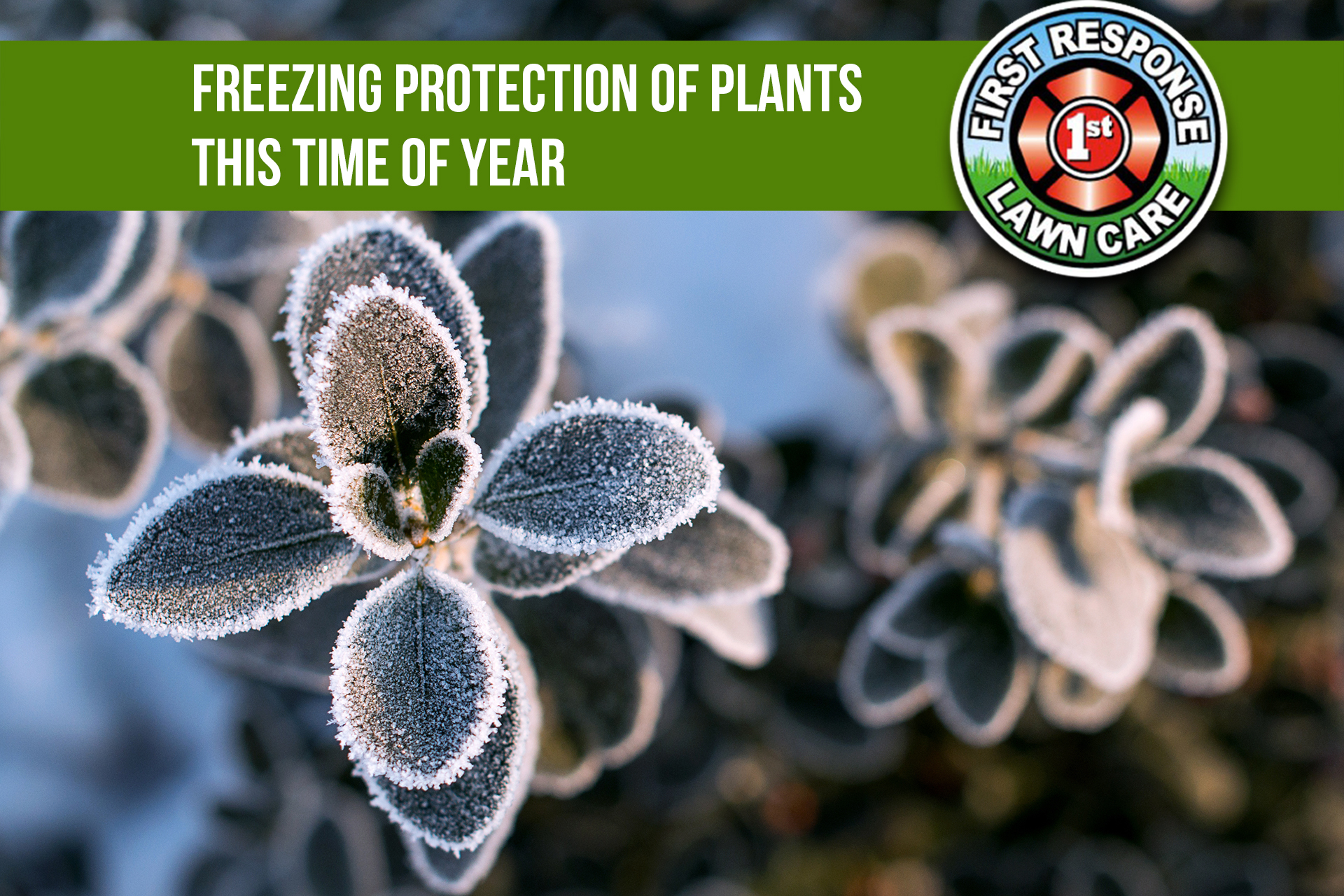
by admin | Jan 18, 2019 | Lawn Care Royse City, Winterizing, Winterizing Your Lawn
Winter is upon us and freezing protection of plants this time of year should be a concern for light snowfall seasons. One day it’s 60° and mild, the next 30°F with snow on the ground. You know what they say about Texas, “If you don’t like the weather, stick around because it will change by tomorrow”.
Frost, freezing and root damage are cause for concern in January. When frost is predicted, you can prepare for it. It’s also a good idea to periodically check the temperature at ground level near your plants to see how cold it is for them and whether or not you need to take precautions.
The primary concern being frost and light snow right now means that there are several things you might want to think about this month.
- If you’re going to cover up your plants before a frost, do so before sunset. If you wait until darkness falls, most of the stored heat in your garden will have dissipated.
- No matter what type of cover you use, make sure that it extends down to the soil on each side.
- Do not leave any openings for warmth to escape. If you can, it’s also helpful to use stakes to keep material, especially plastic, from touching the plant itself.
- In the morning, after frost has thawed, remove covers. Not doing so could cause the plant to come out of dormancy and start growing which makes more susceptible to frost damage in the future.
A few ideas for items you can use to cover plants:
- bed sheets or blankets
- drop cloths
- an inverted flower pot or bucket
- milk jugs with the bottom cut out
- frost cloths (These can protect some plants to temperatures as low as 20°F.)
- garden blankets from your local hardware store
Remember that covers don’t have to be costly to be effective and a little bit of caution goes a long way in protecting your plants against winter weather.
Contact First Response Lawn Care Today! and ask about our expert advice and services.
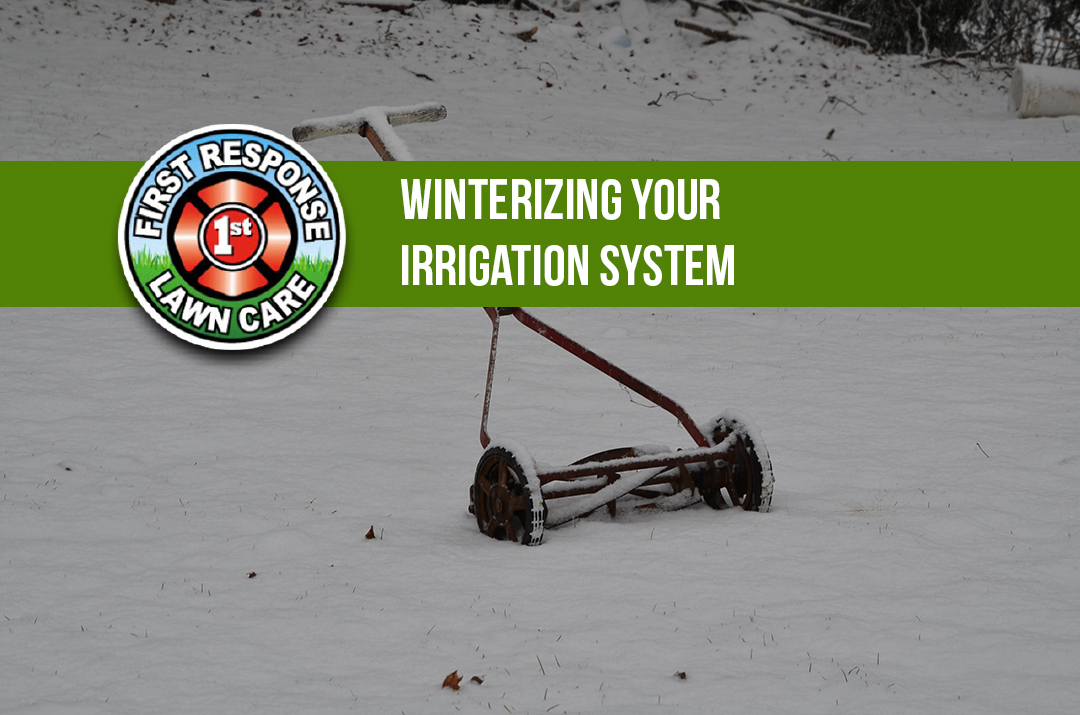
by admin | Jan 11, 2019 | Irrigation Rockwall, Lawn Care Royse City, Winterizing Your Lawn
Wintertime can be hard on your sprinkler system. In Texas, winter weather related damage, can have a lasting effect on watering systems. The freeze/thaw cycle in the winter months can damage pipes and create leakage issues you might not know are there until your next water bill.
Follow these easy steps to help minimize the chance for winter lawn irrigation problems in the coming Spring.
- Turn off the water main to the irrigation system itself.
- Set your irrigation controller to the “rain” or “off” setting.
- Turn on each valve manually to release pressure in the pipes.
- Drain water out of irrigation components that might freeze. (This is usually done at the lowest elevation point or sprinkler head of the system.)
Above ground piping will need additional TLC such as insulation of the system components that are susceptible to to freezing. Using heat trace tape designed to keep the pipes warm during colder temperatures can keep these parts free of problems later on.
Questions? Contact First Response Lawn Care irrigation specialists by clicking the link below to ask about our expert irrigation services.
Contact First Response Lawn Care Today!

by admin | Jan 4, 2019 | Lawn Maintenance Rockwall, Pre emergent Service Fate TX, Winterizing Your Lawn
Pre-Emergent herbicides work by preventing seed germination. They don’t do much good after the weeds bloom. They’re best used as a preventative treatment in winter or summer dormant seasons.
Winter pre-emergent weed control makes warmer, heavy growth seasons manageable. During the Spring and Summer months, weeds thrive in warmer climate of these seasons. Getting a head start in the winter can keep things easy to maintain later in the season when grass is struggling to compete with weeds for water and minerals in the soil. When it comes to weed control, timing is everything. Winter pre-emergent weed control treatments are best applied before the ground temperatures rise past 50 degrees.
Professional-quality pre-emergent herbicides control target grasses and broad-leaf weeds on turf, and landscaping, Pre-emergent herbicides are weed killers that are perfect for Winter application. First Response Lawn Care has professional grade products that aren’t found at do-it-yourself outlets and retail stores.
Contact Us
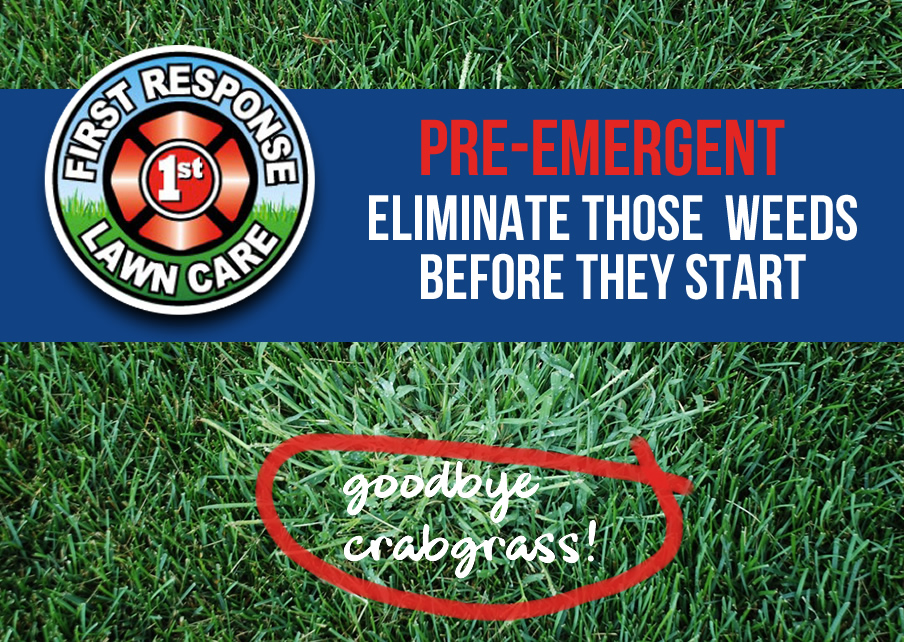
by admin | Dec 14, 2018 | Pre emergent Service Fate TX, Weed Control Royse City
A PreEmergent lawn care product eliminates weeds at the earliest stage of growth — before you even see them. Several key factors are important to consider if you want to use this type of weed killer effectively.
Have you hesitated to use a pre emergent herbicide because you didn’t understand what it does? Did you try to apply a pre emergent yourself and have poor results?
THE BENEFITS Of A PRE EMERGENT
Have you repetitively sprayed weed killers? Have you spent countless hours pulling weeds? If you answered yes to either or both, you need a good pre emergent program. Pre emergents are one of the most important weapons in your pursuit of a beautiful healthy lawn.
Typical applications occur in early spring before warm season weeds appear and in autumn for cool season weeds. These preventative herbicides actually can be helpful throughout the majority of the growing season. Various weeds germinate at different times, so repeated applications of the correct chemical can eliminate the majority of the weeds in any lawn or yard.
The benefits of a consistent pre emergent program are:
- The weed is eliminated permanently, because the seed is allowed to germinate, and the young tender sprout is killed. A PreEmergent is activated in the top layer of soil, where the weed seeds sprout, and by design it stops the plant from growing. This is one key advantage over just putting down new soil or mulch to bury the seeds. Weed seeds remain viable many years, waiting for a chance to pop up. Pre-emergents break the cycle of constant regrowth of new weeds.
- A minimal amount of labor is involved in applying either a granular or a liquid version. The chemical is activated by applying water, usually within a couple of days, sufficient to soak it into the ground. It can remain effective in the soil for several weeks up to several months, depending on the ingredient used and the concentration of it. This benefit comes right at the time when there are so many other gardening tasks to which you want or need to give your attention.
- Deal more easily with any remaining weeds that manage to escape a treatment. Wiping out those straggler weeds and knocking down any remaining population of weeds before they go to seed is critical. Without relying on a preemergent to reduce the infestation, it always seems to be a losing battle to try to kill every weed before it reproduces.
- Each successive season the need to spray a post-emergent weed killer is lessened. The ideal status of completely eliminating weeds would also require that you take other measures to get your lawn healthy, thick and strong. In many yards, due to outside infestations, the need to continue with this herbicide will continue.
A pre-emergent is NOT effective once the weeds are showing. The chemical must be situated in place prior to the weed seed starting to germinate. If you wait, you lose. Call First Response Lawn Care (214) 701-7622 today to sign up for our effective 7-step program to feed your lawn and control your weeds! We are happy to provide a free estimate! Be sure to check for any current promos before calling.
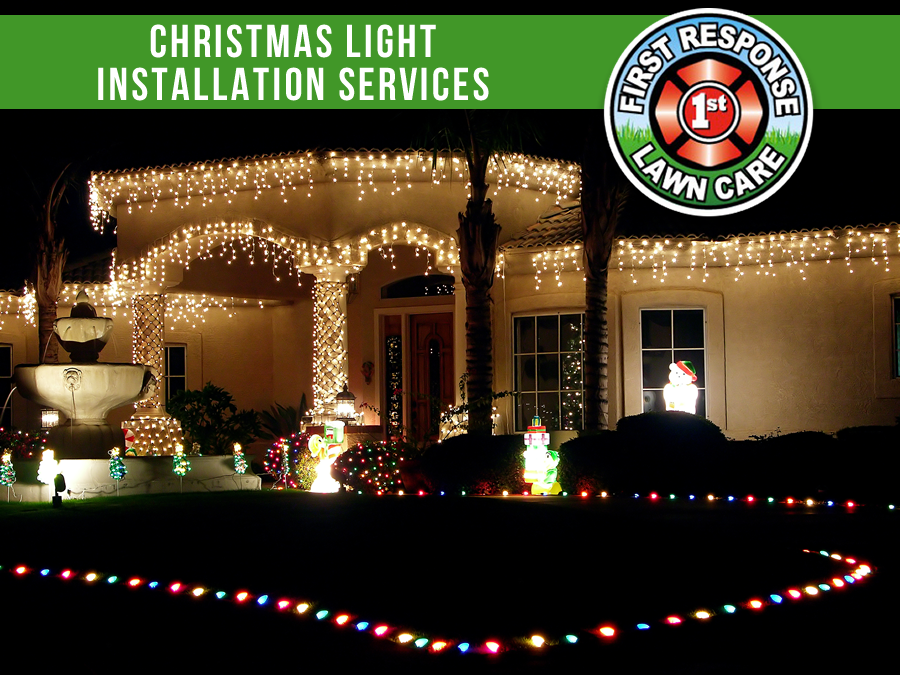
by admin | Dec 5, 2018 | Holiday Light Installation Rockwall
Christmas Light Installation Rockwall Texas
Take the work out of decorating for Christmas by letting First Response Lawn Care design a custom Christmas light display for your home. Our Christmas light installation crews service Rockwall and the surrounding areas.
Christmas Light Installation Services
- Design
- Residential Lighting
- Tree Lighting
- Christmas Décor Options
- Energy Efficient (Green) Christmas Lights
We can help you with most things related to Christmas lighting and design, installation and take down.
Let our experienced technicians create an outstanding light display for you this holiday season. Ready to get started? Call First Response Lawn Care for a quote at 214-701-7622.
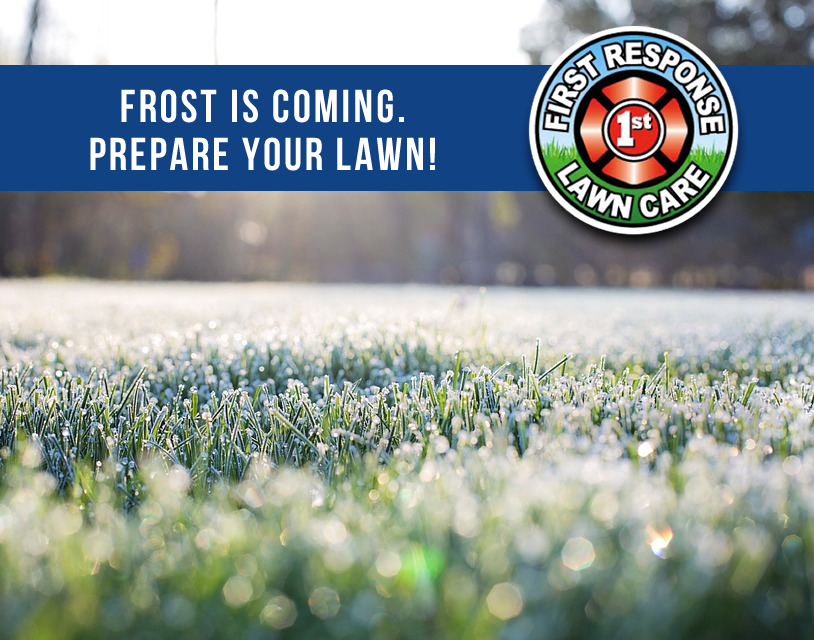
by admin | Nov 9, 2018 | Water Conservation, Watering, Winterizing Your Lawn
Looks like freezing temps are in our future. If you have a sprinkler system, be sure to turn off your controller to avoid busted pipes and frozen driveways. Here are some water conservation tips for all and winter months.
FALL WATER CONSERVATION TIPS
In the fall, plants require less water. Adjust your system accordingly.
Thinking about overseeding your yard? Over-seeding warm-season lawns, such as Bermudagrass, with cool-season grasses, such as perennial rye grass in the fall can provide a beautiful landscape until spring in Texas. However, from a water conservation standpoint, landscaping experts don’t recommend over-seeding with perennial ryegrass. An over-seeded lawn will require more irrigation because of the water needs of cool-season grasses versus the reduced water requirements of dormant warm-season grasses. When establishing new lawns in the fall, apply for a short-term watering variance. It will allow daily irrigation of new sod or over-seeded grasses for 30 days without risk of a citation.
To prepare for winter and freezing conditions, turn off water, drain valves and blow out excess water in the lines with compressed air.
Disconnect, drain, coil and store garden hoses to reduce wear.
Check your water usage history for unusual changes that may signal leaks or other wasteful problems.
If you have a sprinkler system, it’s a good time to have it checked out by a professional. Call First Response Lawn Care if you need an inspection of your irrigation system.
BUCKLE DOWN FOR WINTER
Tree roots continue to grow during the winter. If extended dry spells are experienced, consider hand watering your trees once a month.
Check your lawn. Warm-season grasses (like Bermudagrass) go dormant during winter months, but they still require adequate moisture. Cool-season lawns, like tall fescue, only need 1″ of water every two weeks. Irrigate your lawn in the morning during warmer winter days to avoid winter kill if dry conditions persist.
Turn sprinklers off during freezing temperatures to avoid icy streets and can even result in a fine.
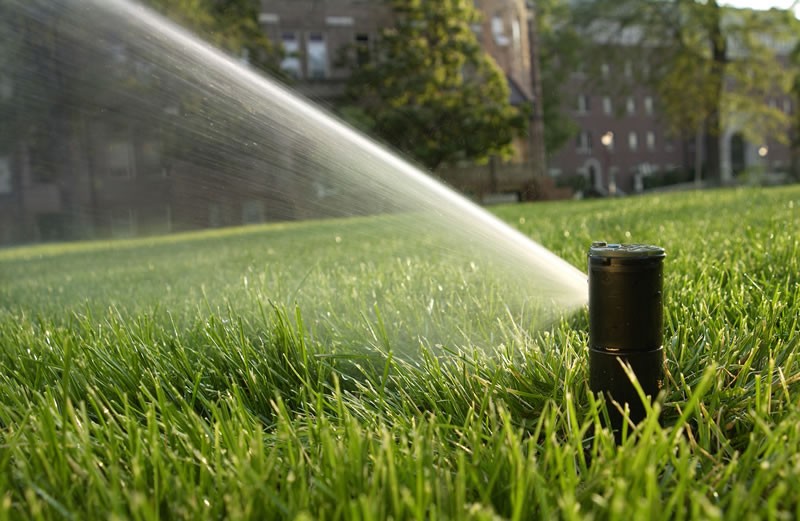
by admin | Oct 26, 2018 | Sprinkler Systems Rockwall
Sprinklers help keep your lawn properly watered and looking lush. But at the end of the watering season, it’s important to winterize your sprinkler system.
As the temperatures drop and you begin to use your home sprinkler system less and less, don’t forget one of the most important to-do’s for your home. First Response Lawn Care recommends winterizing your home’s sprinkler system before the really cold weather arrives
Underground Sprinkler Systems Can Burst
Underground sprinkler systems can freeze and the pipes can burst, causing expensive repairs if water is not properly drained and blown out. A little preventative maintenance can save you money and headaches down the road. First Response Lawn Care can safely and properly remove the water and prepare your system for the winter.
Burst Pipes Causes Multiple Problems for Homeowners
When temperatures fall below 25 degrees at night, if there is water left in sprinkler systems, it can cause the pipes to burst creating problems:
Flooded Lawns
Damage to Landscaping
Damage to Neighbor’s Lawn
Costly Repairs
Many times we get frantic calls from homeowners describing a ´geyser´ in their yard because a pipe burst.
Another problem area occurs when hoses are left attached to outdoor faucets. As a rule of thumb, all out door water sources should be free of water by mid-November to be safe.
For more information about First Response Lawn Care’s sprinkler winterization and repair services, give us a call (214) 701-7622

by admin | Oct 19, 2018 | Fertilize Treatments Rockwall
Herbicides Rockwall
First Response Lawn Care has one mission – to give you a healthy lawn year round. By combining our 7 step program with good mowing and watering practices, your lawn should stay healthy and green all year long.
Autumn is the time for herbicides Rockwall, Royse City and surrounding areas. It’s also time for overseeding and other preventive maintenance to keep your lawn looking good into winter and onto Spring.
Let’s start with dethatching. Thatch, a mat of yellowish dead grass that can block air and moisture, needs to be removed. If you slacked on the dethatching in spring, now is the time, but don’t go at it too aggressively.
If you need to reseed, use proprietary turfgrass seed, available at nurseries, on the Web, and from landscape-supply houses. Turfgrass breeders constantly improve their seed, and many produce specific regional types. While this seed is more expensive than what’s sold at home centers, it’s also more vigorous. Cira quotes the old adage that a cheap tool is an expensive tool. “You might pay a few dollars more for a proprietary seed, but the results are tremendous, and you don’t have to keep constantly reseeding,” he says.
To seed a bare area, till the soil, apply the seed, and then cover it with a thin layer of lightweight, compost-soil/peat-moss blend. Then be sure to keep it moist. Once the seeds get dry, they’re dry for good.
Remove leaves‚ they block sunlight just when grass needs as much light as possible for photosynthesis and root growth. Grass should go from vigorous growth into winter, not enter it weak and underfed.
Even when the lawn is dormant, it needs to eat. Don’t fall at the last hurdle. We can put the lawn to bed with winterizer to promote root stability, cold-weather hardiness, and disease resistance, so you get great results come spring. The lawn greens up much quicker with fertilization.
We can give you a football worthy lawn to impress your friends and family for the holidays. Call us to get started on your Pre-post emergent.
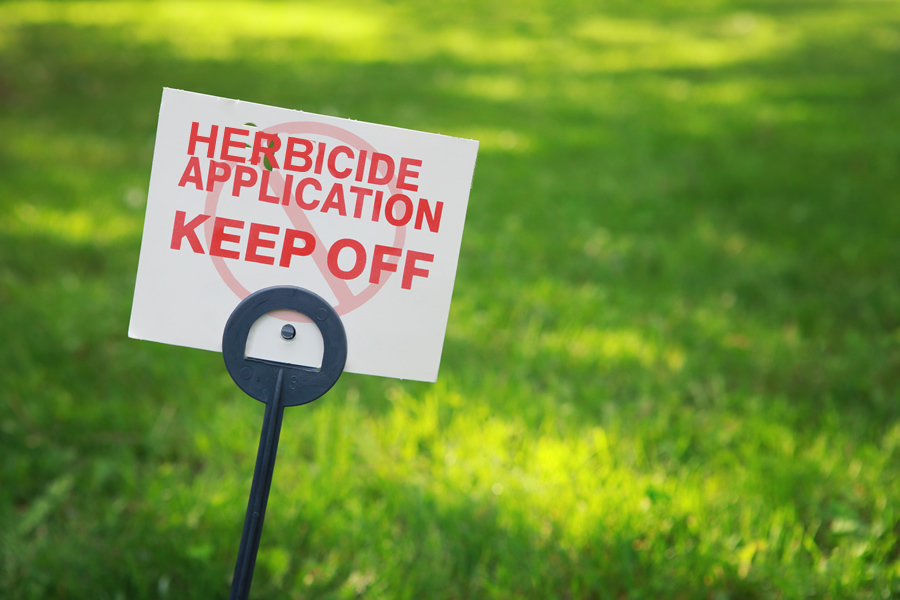
by admin | Oct 9, 2018 | Herbicides
October and November are important months for your Texas lawn.Most annual winter grasses and weeds that plague lawns in late winter and early spring begin to germinate in September and October.
The best way to stop them in the lawn is to apply a pre-emergence herbicide before the weed seeds start to germinate. Now is a good time to work on this problem as well. Pre-emergent herbicides are chemicals that kill weed seedlings as they germinate. They are not effective once weeds grow beyond the seedling stage. They should be applied according to the label in a uniform broadcast treatment, followed by at least 1/2 inch of rain or irrigation to move the product down to the soil where it is activated.
Post-emergence herbicides are used for weeds which have already begun to show up. You have to be careful with these because most of them can damage St. Augustine grass if temperatures are in the mid to upper 80’s. There is a “window” of time in the fall to catch the broadleaf winter weeds. The earlier you catch them the better. Just watch out for days which are too warm. Also be careful not to get them on desirable flowers, shrubs, etc. They don’t know the difference between a broadleaf weed and a broadleaf ornamental!
Over-seeding is generally not recommended on St. Augustine lawns. It competes with the grass for sunlight, nutrients and water. The additional competition from over-seeding slows spring recovery of the turf. If your turf is stressed or weak already, avoid over-seeding altogether. It will only make the problem worse.
Remember to reduce your watering as temperatures start to cool off over the next few months. Turf will not need the typical 1” per week watering. Excessive water will only be wasted. Reducing or turning off irrigation will not only save water but will reduce your water bill.
If you need help with your pre and post emergent application, call First Response Lawn Care Rockwall today at (214) 701-7622.










